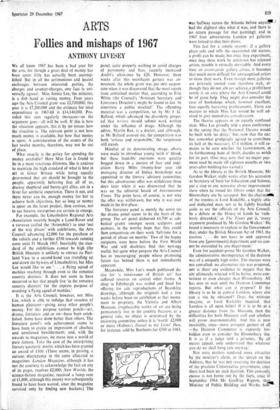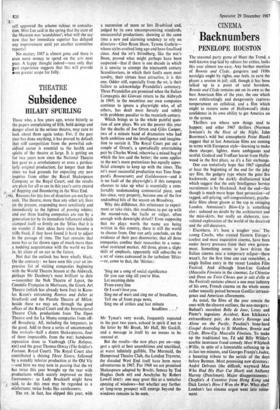Follies and mishaps of 1967 ARTS
ANTHONY LIVESEY
We all know 1967 has been a bad year for the arts, for though a great deal of money has been spent little has actually been accomp- lished. But in all the acrimonious and heated exchanges between interested parties, the charges and counter-charges, one fact is uni- versally agreed: Miss Jennie Lee, the minister, is a dab hand at raising money. Four years ago the Arts Council grant was £2,730,000; this year it is £7,200,000 and the estimate for total expenditure in 1967-68 is £14,140,000. Pro- vided this sum regularly increases—so the argument goes—all will be well. If this is how the situation appears, this is by no means how the situation is. The relevant point is not how much money is available, but how that money is spent. A consideration of the events of the last twelve months, therefore, may not be out of place.
What exactly is the policy for spending the money available? Here Miss Lee is found to be in a most vexatious dilemma. She is anxious to maintain the high standard of what is best in art in Great Britain while being equally determined that art should be brought to the people, apparently believing that all of us, drowsy shepherd and bunny-girl alike, are in a fever for aesthetic experience. There is not, and there never can be, enough money for her to achieve both objectives, but so long as money is spent on the latter project, then curious, not to say bizarre, enterprises are certain to emerge.
For example, the Lincolnshire Regional Arts .Association recently bought a Land-Rover and a caravan (called the 'Artmobile') to tour 'out of the way places' with exhibitions, the Arts Council advancing £2,000 for the purchase of the vehicle and a further £550 towards running costs until 31 March 1967. Inevitably the stan- dard of the exhibitions cannot be high (the British Museum is unlikely to entrust its Port- land Vase to a second-hand van trundling up and down the byways of Lincolnshire), but Miss Lee would like to see '. . . a flying squad of mobiles reaching through even to the remotest country districts.' It dues not seem to have occurred to her that people live 'in the remotest country districts' for the express purpose of avoiding 'a flying squad of mobiles.'
It is the Arts Council, however, not Miss Lee, which is able to indulge that sweetest of human pleasures—giving away other people's money. For this purpose various panels—art, drama, literature and so on—have been estab- lished. Some have done better than others. The literature panel's sole achievement seems to have been to create an impression of absolute and unrelieved bewilderment; and, with the awards to magazines, we move into a world of pure fantasy. Take the case of the enterprising literary quarterly Ambit, which has been granted an award of £100. (There seems, in passing, a curious discrepancy in the sums allocated to magazines. London Magazine, although it has not the courtesy to acknowledge the fact on any of its pages, receives £2,000; New Worlds, the .
science-fiction magazine, received a lump sum
of £1,800, although this money was subsequently found to have been wasted, since the magazine survived only by finding new backers.) The
panel, quite properly wishing to avoid charges of parsimony and bias, recently increased Ambit's allowance by £20. However, three weeks after this munificent gesture was an- nounced, the whole grant was put into suspen- sion when it was discovered that the most recent issue contained matter that, according to Eric White (the Council's 'Assistant Secretary and- Literature Director'), might be found in law 'to constitute a public mischief.' The offending material was a competition, set by Mr J. G. Ballard, which advanced the disorderly propo- sal that writers should submit work written under the influence of drugs. Although the editor, Martin Bax, is a doctor, and although, as Mr Ballard assured me, the competition was both 'serious and responsible,' the suspension still stands.
Mindful of its deteriorating image, efforts were made' to introduce young 'with it' blood, but these laudable exertions were quickly bogged down in a morass of fear and inde- cision. Barry Miles (twenty-four year old managing director of Indica bookshop) was appointed to the literary advisory committee, but this adventurous offer was withdrawn three days later when it was discovered that he was on the editorial board of International Times. The point here, of course, is not why the offer was withdrawn, but why it was ever made in the first place.
The literature panel is merely the worst (as the drama panel seems to be the best) of the group. The art panel disbursed £4,700 as sab- batical grants amongst seven sculptors and painters, in the worthy hope that they could then concentrate on their work 'full-time for a period of about six months.' Two of the happy recipients were born before the First World War and will doubtless find this nest-egg useful, but quite what purpose the Arts Council has in 'encouraging' people whose promising future lies behind them is not immediately apparent.
Meanwhile, Miss Lee's much publicised de- sire for 'a renaissance of British art' has suffered reverses on several other fronts. A shop in Edinburgh was raided and fined for offering for sale reproductions of Beardsley drawings, although the originals had a few weeks before been on exhibition at that monu- ment to propriety, the Victoria and Albert Museum; irreplaceable works of art are being permanently lost to the country because, as a general rule, no object is scrutinised by the reviewing committee unless it is 'worth' £2,000 or more (Rubens's Daniel in the Lions' Den, for instance, sold by Bonhams for £500 in 1963,
was halfway across the Atlantic before anyortit I had the slightest idea what it was, and there is no return passage for that painting); and in 1967 four adventurous London art galleries were forced to shut their doors.
This last for a simple reason: if a gallery plays safe and sells the occasional old master,
a profit can be made, but once they experiment, once they show work by unknown but talented artists, trouble is virtually inevitable. And every time an avant-garde gallery closes, it becomes that much more difficult for unrecognised artists to show their work. Even though most galleries are privately owned and therefore seek, al-
though they do not always achieve, a profit)here surely is an area where the Arts Council could be of great help. They might also consider the case of bookshops which, however excellent, face equally harassing predicaments. These are matters to which Miss l.ee would be well ad- vised to give immediate consideration.
The theatre appears in an equally confused state. Miss Lee proudly told a press conference in the spring that the National Theatre would
be built with 'no delay:' but, now that the OLC has somewhat grudgingly agreed to contribute
its half of the necessary £7.4 million, it still re-
mains to be seen whether the Government, in its forthcoming bout of thrift, decides to welsh
for its part. (One may note that no major pay- ment need be made till eighteen months or two years after building has started.) As to the library at the British Museum, Mr Gordon Walker, eight weeks after his accession
as Secretary of State for Education and Science, put a stop to any nonsense about improvement there when he issued his fiihrer order that the Bloomsbury site be scrapped. But the chairm
of the trustees is Lord Radcliffe, a highly able and dedicated man, not to be lightly brushed aside as are the officials of the Arts Council.
In a debate in the House of Lords he 'ruth- lessly discarded,' as The Times put it, 'every argument produced by Mr Gordon Walker.' He found it necessary to explain to the Government that, under the British Museum Act of 1963, the trustees '. . . do not have to seek approval from any [government] department and we can- not be overruled by any department.'
Even for accident-prone Mr Gordon Walker, the administrative incompetence of the decision was of a uniquely high order. The trustees were not consulted; no alternative site was proposed, nor is there any evidence to suggest that the site ultimately selected will be better, more con- venient or even cheaper than Bloomsbury. All has now to wait until the Dainton Committee reports. But what can it propose? If the library is to be in central London, where else can a site be obtained? Does the minister imagine, as Lord Radcliffe inquired, that
London is all open fields? If it is to be at a greater distance from, the Museum, then the difficulties for both Museum staff and scholars will prove insurmountable. And this is now inevitable, since—most arrogant gesture of all —the Dainton Committee is expressly for- bidden even to consider the Bloomsbury site. It is as if a judge told a prisoner, 'By all means appeal, only understand that whatever you do we shall hang you anyway.'
Nor were matters rendered more attractive by the minister's claim, in the speech on the Address, that he was not reversing the decision of the previous Conservative government, since there had been no such decision. This cowardly excuse is not borne out by the facts, since iri September 1964 Mr Geoffrey Rippon, atm,. Minister of Public Building and Works, hinir''•
self approved the scheme subject to consulta- tion. Miss Lee said in the spring that the state of the Museum was 'scandalous': what will she say now that her immediate superior has delayed any improvement until yet another committee reports?
No matter; 1967 is almost gone and there is even more money to spend on the arts next year. A happy thought indeed—save only that fast experience suggests that this will provide oven greater scope for folly.











































 Previous page
Previous page